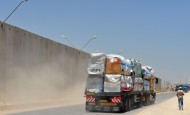World Vision's Problems Go Beyond the Gaza Corruption Trial
The issues raised by the arrest of the head of World Vision Australia’s Gaza operation cannot simply be dismissed as a “storm in a teacup”, as suggested by Rev. Tim Costello of World Vision Australia. The detailed concerns raised by MP Michael Danby and others are serious and deserve far more investigation and debate than has taken place to date.
Beyond the allegations – to be tried in an Israeli court – that the head of World Vision’s Gaza operations diverted $50 million in aid money to Hamas for direct use in deadly terror activities, the evidence shows that World Vision Australia has failed to properly oversee the use of funds. The various explanations from Rev. Costello and others notwithstanding, the financial documents published by World Vision about its operations are inconsistent and incomplete. The reports provided by WV’s Israel branch show annual budgets of approximately $16 million — this amount is far from the claim that the Gaza budget was only $22.5 million over 10 years. In addition, the small budget stated by Rev Costello to refute the allegations of corruption cannot possible account for 120 WV employees in Gaza. (For a detailed analysis of WV Gaza financial reports, see here.)
These are neither trivial nor private issues. The bulk of these funds come are from AusAid, making the concerns very public, and for this reason, the Australian government, as well as Germany and the UK, which have provided smaller amounts, have frozen transfers to World Vision.
Yet, for two months, World Vision, Reverend Costello, and his supporters have failed to address the evidence – instead they have lashed out at Mr. Danby for asking the questions that Members of Parliament are supposed to ask. Costello told The Age “We want to see the evidence. And we’ll act very, very quickly if there’s evidence. We absolutely condemn terrorism or diversion of any funds” – but the evidence is there, before his eyes, and he has chosen to ignore it.
Furthermore, while it is unlikely that World Vision officials would knowingly accept the diversion of aid to a terror organization, this does not mean the organization is without fault. In choosing to operate in Gaza, aid groups are dependent on the cooperation with Hamas – a terror organisation with a fundamentally immoral agenda – no one disputes this. Hamas controls Gaza, so that humanitarian aid projects are under its shadow. The concrete for the massive terror tunnels that are being constructed must be making their way from the aid provided by the UN and groups like World Vision to Hamas, and the same is true for the resources that pay for the terrorists themselves and for other activities. And yet the record shows that World Vision officials continue about their business, failing to adequately consider the environment or the impact on the civilians in Gaza who are deprived of the aid that is stolen, and on the Israeli children who are often the victims of Hamas terror. When and where has Reverend Costello discussed the difficulties that this situation presents, and his organisation’s policies in response? Instead, when he discusses Israelis and Palestinians, he talks about abstractly, far from this reality.
On the specifics, the allegations against its Gaza manager mean that, if proven in court, World Vision was grossly negligent in failing to properly conduct due diligence and oversight of how government funds were spent. More than two years ago, a study of conditions in Gaza showed that the potential for aid diversion from World Vision was high, given its stated readiness to work with “armed groups”. The procedures and safeguards, if any, used to prevent this remain unknown.
Despite all of the evidence and controversy, World Vision has chosen to attack the messengers. Instead of providing full financial reports and answering the questions to the extent possible, or acknowledging the lack of information necessary to respond, Rev. Costello and other officials try to shift the focus by attacking the Israeli judicial system.
A second set of issues in the controversy regarding Reverend Costello’s Hadassah Oration concerns the unfortunate record of World Vision officials in expressing blatant and immoral hostility towards Israel, mixed with “replacement theology” — a major source of antisemitism for centuries. Reverend Costello has failed to speak out against this, and when he does address issues related to Israel as a Jewish state (in a world with 55 self-declared Islamic states and at least 30 Christian countries), his words are often seen as insensitive and condescending — probably unintentionally, but still sources of pain.
As is often the case, World Vision’s best course of action is accepting full responsibility, displaying complete transparency and outside expert assistance. Until there are satisfactory and substantive responses from World Vision officials, including Rev. Costello, questions related to corruption, lack of financial accountability, and emotional hostility to Israel will continue to resonate and overshadow any positive contributions.



